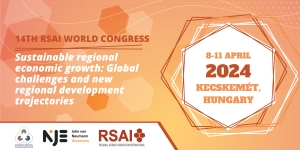Miscellaneous News
Elisabete Martins
RSAI World Congress - Last CFP
Dear RSAI members,
we hope all is well with you and your families.
We are writing you for a last reminder on the pending final deadline for submitting your abstracts for presentation at the RSAI World Congress, Kecskemét, Hungary, Apr. 8-11, 2024.
The final deadline for submitting your abstracts is due Dec. 31, 2023. After this date, the portal for submissions will close and a second and last round of revisions will be sent out to scientific committee members for their opinions on the fit of your works for the congress. Acceptance letters will be sent out within mid January, and once the roster of papers will be final, we will gladly move to organize what we promise to be an exciting scientific program, with 5 excellent keynotes (https://regionalscience.org/2024RSAIcongress/index.html), progressive rates (https://regionalscience.org/2024RSAIcongress/registration.html), and generous support for members hailing from low and lower-middle income Countries (https://www.regionalscience.org/index.php/programs/building-bridges.html).
Please do not forget to register once your paper is accepted.
Thank you in advance for your attention,
We both look forward to seeing you in Kecskemét!
Hans Westlund
Professor of Urban and Regional Studies
KTH Stockholm
RSAI President
Andrea Caragliu
Associate Professor of Regional and Urban Economics
Politecnico di Milano, ABC Department
RSAI Executive Director
Encyclopedia: ‘World of Regional Science’
Invitation to RSAI members
THE WORLD OF REGIONAL SCIENCE
Dear regional science colleague:
We have decided to compose a unique volume which summarizes the ‘world of regional science’ in the form of an Encyclopedia. This major opus seeks to become a kind of ‘Wikipedia’ for regional scientists. It will comprise of an organized collection of hundreds of entries on concepts, theories, methods and applications. Each item will contain about 1000 words, written according to a systematic pre- determined format.
This work aims to become some sort of collective and shared body of knowledge in our field. Several hundreds of regional scientists from all over the world have already committed themselves to write an item text, which does not take much time. At this moment we still have a vacancy for about 100 entries (see attached list). All regional scientists are cordially invited to write a concise entry on one of the selected topics, by writing before December 23, 2023 an expression of interest to the handling editor, Zeynep Elburz (This email address is being protected from spambots. You need JavaScript enabled to view it. or This email address is being protected from spambots. You need JavaScript enabled to view it.).
You will then receive the necessary information.
We hope to make this joint effect a collective success for regional science.
Peter Nijkamp
Karima Kourtit
Kingsley Haynes
Zeynep Elburz
Attached: list of vacant entries
Call for Paper | 50th RSAI-BIS Conference, 9-11 July 2024, Bristol, England

All information at the congress website: https://www.rsai-bis.org/
Dear members,
We are excited to announce that our 50th annual RSAI-BIS conference will take place in Bristol, 9th-11th July 2024.
The Spatial Economic Analysis Keynote Lecture will be given by Professor Robert Huggins (Cardiff University) on "Cultures of Possibility and Regional Development: Changing Behaviour, Values and Narratives".
For more information on the conference see here.
The Call for Abstracts is now open until February 14, 2024. You can submit an abstract here.
We also welcome proposals for special sessions in this link.
We look forward to your submissions and to see you in Bristol!
On behalf of the RSAI-BIS Committee,
Tasos Kitsos
Call for Papers: 19th IRSA Conference,15-16 July 2024, Ambon, Indonesia
Call for Papers | 19th IRSA International Conference.
Ambon, 15-16 July 2024
https://www.facebook.com/photo/?fbid=689645716589743&set=a.429065522647765
Call for papers – XLV AISRe Annual Scientific Conference, 4-6 September 2024, Turin, Italy
Call for papers
The Italian Regional Science Association (A.I.S.Re), the Italian Section of the Regional Science Association International (RSAI), announces its XLV Annual Scientific Conference and welcomes contributions from researchers working on different disciplines in the field of regional science. The conference venue is Università degli Studi di Torino, Campus Luigi Einaudi, Lungo Dora Siena, 100A.
The central theme of the conference is the digital and circular transformation and the new opportunities and challenges emerging from these radical changes for regions and cities. Despite the large commitment and investments envisaged by the PNRR, the adoption of the new digital technologies remains weak and highly unbalanced across businesses and territories, with the risk of worsening the territorial gaps between North and South as much as between centers and peripheries, and of postponing the much desired, and increasingly necessary, relaunch of productivity. The transition towards a circular economy, made compelling by the climate crisis, has found a further obstacle in the rapid and unexpected growth of inflation, and in particular in the sharp increase in energy prices, especially following the explosion of the conflict in Ukraine. The combination of these factors depict a new, more complex and changing scenario in which the future of the territories must be framed and appropriately rethought, in order to make the best of the vast possibilities offered by the PNRR, already in the early stages of implementation. The conference aims to represent an opportunity for reflection and discussion on the determinants and consequences of the digital and circular transformation underway in the various territories, as well as on the governance policies and structures which, in a context of greater political and economic uncertainty and turbulence, can better initiate and/or facilitate the transition towards a phase of renewed growth of the country and its regions and cities.
Besides the main theme, the A.I.S.Re conference encorauges the discussion on the major topics in regional science. Thus, the A.I.S.Re invites all those interested to present original scientific works on the following themes:
- Governance, regional and territorial public policies, European programming
- Growth, decline, and regional disparities
- Globalization, value chains and local production systems
- Methods of territorial analysis and spatial econometrics
- Labor, welfare, personal services and social policies
- Tourism, culture and local development
- Urban planning, real estate market and city development processes
- Infrastructure, transport, mobility and local development
- Wellbeing, sustainability, and local development
- Urban development and agglomeration economies
- Development and local entrepreneurship
- Innovation, creativity and local development
- Policy evaluation methods
HOW TO JOIN THE CONFERENCE
There are two ways to participate in the Conference:
- with organized sessions. Participants can propose themselves as session organizers (no more than two sessions per organizer) on specific themes. The proposal can be submitted directly from the login area of the website, by entering the name of the scientific manager, the session title and the tentative number of presentations. The deadline for the submission is January 31, 2024.
- with individual papers. Those interested should submit an abstract by February 29, 2024, directly from the login area of the website. Consult this LINK to see detailed instructions for abstract submission. A template file for writing the papers is also available on the Conference site (LINK).
IMPORTANT DEADLINES
|
March 31, 2024 |
Paper acceptance |
|
May 31, 2024 |
Registration at early bird fee |
|
June 20, 2024 |
Registration at full fee |
|
July 15, 2024 |
Papers submission |
|
July 20, 2024 |
Programme publication on the website (www.aisre.it), based on payed registrations |
AWARDS
AISRe promotes the diffusion of studies in regional science by awarding young scholars with:
- Best PhD Dissertation Award
- Best young scholar paper
The call for candidatures and their instructions are available on AISRe website (www.aisre.it/en/awards).
CONFERENCE REGISTRATION AND MEMBERSHIP
Registration and participation in the Conference is subject to A.I.S.Re. membership, as individual, corporate or young member, available in the login area. Registration and membership fees are available at this LINK.
A.I.S.Re membership benefits include:
- the subscription to Scienze Regionali (Italian Journal of Regional Science) for the following calendar year;
- the volumes of the Regional Science Series (FrancoAngeli) published during the business year and the AISRe E-book (Donzelli);
- the registration to the Regional Science Association International (RSAI), which includes an online subscription to the journals Papers in Regional Science and Regional Science Policy and Practice for the following calendar year, the opportunity to pay a reduced fee at the Annual Conferences of the European Regional Science Association (ERSA) (www.ersa.org) and the Regional Science Association International (RSAI) (www.regionalscience.org).
- Young scholars have also the opportunity to participate to the Summer/Winter Schools of A.I.S.Re.
Local Organising Committee
- Valentina Biconne, Politecnico di Torino
- Massimiliano Coda Zabetta, Università degli Studi di Torino
- Alessandra Colombelli, Politecnico di Torino
- Elettra D’Amico, Politecnico di Torino
- Fabrizio Fusillo, Università degli Studi di Torino
- Gianluca Orsatti, Università degli Studi di Torino
- Andrea Panelli, Politecnico di Torino
- Francesco Quatraro, Università degli Studi di Torino (Chair)
- Silvia Francesca Rota, Università degli Studi di Torino
- Alessandra Scandura, Università degli Studi di Torino
Scientific Committee
- Cristiano Antonelli, Università degli Studi di Torino
- Alessandra Colombelli, Politecnico di Torino
- Egidio Dansero, Università degli Studi di Torino
- Davide Piacentino, Università degli Studi di Palermo
- Francesco Quatraro, Università degli Studi di Torino
- Elena Ragazzi, IRCrES-CNR - Istituto di Ricerca sulla crescita economica sostenibile
- Alessandra Scandura, Università degli Studi di Torino
- Stefano Usai, Università degli Studi di Cagliari
Promoting Committee
- Carlo Cambini, Politecnico di Torino
- Raffaele Caterina, Università degli Studi di Torino
- Christophe Feder, Università Valle d’Aosta
- Aldo Geuna, Università degli Studi di Torino
- Simone Landini, IRES Piemonte
- Elisabetta Ottoz, Università degli Studi di Torino
- Massimiliano Piacenza, Università degli Studi del Piemonte Orientale
- Francesco Ramella, Università degli Studi di Torino
- Michele Rosboch, Università degli Studi di Torino e IRES Piemonte
- Roberto Zanola, Università degli Studi del Piemonte Orientale
Executive Board A.I.S.Re.
- Mariarosaria Agostino, Università della Calabria
- Cristina Bernini, Università di Bologna
- Cristina Brasili, Università di Bologna
- Roberta Capello, Politecnico di Milano
- Augusto Cerqua, Università di Roma La Sapienza
- Marusca De Castris, Università degli Studi Roma Tre
- Silvia Emili, Università di Bologna
- Valeria Fedeli, Politecnico di Milano
- Camilla Lenzi, Politecnico di Milano Marco Mariani, IRPET
- Ilaria Mariotti, Politecnico di Milano
- Marco Modica, Gran Sasso Science Institute (GSSI)
- Davide Piacentino, Università di Palermo
- Elena Ragazzi, IRCrES-CNR - Istituto di Ricerca sulla crescita economica sostenibile
- Laura Resmini, Università di Milano Bicocca
- Domenico Scalera, Università del Sannio
- Daniela Storti, Consiglio per la ricerca in agricoltura e l’analisi dell’economia agraria (CREA)
- Silvia Cerisola, Politecnico di Milano Simone Landini, IRES Piemonte
- Pietro Pizzuto, Università di Palermo
Segreteria Tecnica A.I.S.Re.
Diana Sarmiento, This email address is being protected from spambots. You need JavaScript enabled to view it.
ERSA2024 Congress | The Call for Abstracts (and) Papers is OPEN!
|
|
|
|
|
|
|
|
|
|
|
|
Call for applications | The Peter Nijkamp Research Encouragement Award
Call for applications
The Peter Nijkamp Research Encouragement Award
The award recognizes the outstanding potential of a mid-career researcher from a nation in the developing world in which there is a section of RSAI. Conditions for applications are:
- No more than 10 years from the doctoral qualification (by Dec 31, 2022);
- Live in developing nations continuously for at least three years as at Dec 31, 2022;
- Be a member of RSAI in good standing;
- Submit a written formal research paper on a topic in Regional Science;
- Submit an updated version of CV.
All material must be submitted to the This email address is being protected from spambots. You need JavaScript enabled to view it.
Nominees will be judged in part on the evaluation of the paper and in part on an evaluation of the research track record and performance (CV).
The winner(s) will receive support, up to 750 Euro, to participate in a Supra-Regional meeting or in the World Congress, at which the paper will be presented.
The jury will comprise the Immediate Past-President of RSAI as Chair, an Editor of Papers in Regional Science, and two RSAI Fellows.
Deadline for the applications: February 28, 2024.
ERSA Monthly E-news - November 2023
|
|
|
|
|
|
|
|
|
|
|
|
|
|
|
|
|
|
|
|
|
|
|
|
|
|
|
|
|
|
|
|
|
|
|
|
|
|
|
|
|
Extension deadline | 2024 RSAI World Congress, 8-11 April, 2024, Kecskemét, Hungary
Dear RSAI members,
We hope this email finds you all well.
We are writing you concerning the deadline for submitting your abstracts to the 14th edition of the World Congress of the RSAI in Kecskemét, Hungary, from Apr. 8 through 11, 2024. The congress' main theme is "Sustainable regional economic growth: global challenges and new regional development trajectories"
Following the requests from many angles of the world, the RSAI decided jointly with the LOC to postpone the deadline for submissions to Dec. 31, 2023.
There is still room for organizing one or more special sessions at the World Congress; if you are interested in organizing one, please do get in touch with the Program Chair, Andrea Caragliu (This email address is being protected from spambots. You need JavaScript enabled to view it.) and the congress secretariat (This email address is being protected from spambots. You need JavaScript enabled to view it.) as soon as possible.
Decisions concerning the acceptance of papers and sessions submitted between now and the final deadline will be announced by mid January 2024. Once accepted, presenters will be able to register on the same platform used for submitting your abstracts. You will find all information related to the congress, and the link to the submission platform, at the congress website:
https://regionalscience.org/2024RSAIcongress/index.html.
Thank you in advance for your attention,
We look forward to seeing you in Kecskemét!
Call for Applications to The Benjamin H. Stevens 2024-2025 Graduate Fellowship in Regional Science
THE BENJAMIN H. STEVENS 2024–2025
GRADUATE FELLOWSHIP IN REGIONAL SCIENCE
Graduate students enrolled in Ph.D. programs in North America are encouraged to apply for the Twenty-Fourth Benjamin H. Stevens Graduate Fellowship in Regional Science, administered by the North American Regional Science Council of the Regional Science Association International (NARSC-RSAI).
This Fellowship, in support of dissertation research in Regional Science, is awarded annually in memory of Dr. Benjamin H. Stevens, an intellectual leader whose selfless devotion to graduate students as teacher, advisor, mentor, and friend had a profound impact on the field. Regional Science is a multidisciplinary field concerned with urban and regional phenomena. Regional Scientists apply theoretical and empirical frameworks and methods of the social and other sciences, as well as develop new ones specifically for regional analysis and policy.
----------------------------------------------------------------------------------------------------------------------------------------------
Please find the details in the attached Call for Applications.
About Us
The Regional Science Association International (RSAI), founded in 1954, is an international community of scholars interested in the regional impacts of national or global processes of economic and social change.

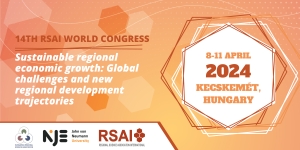
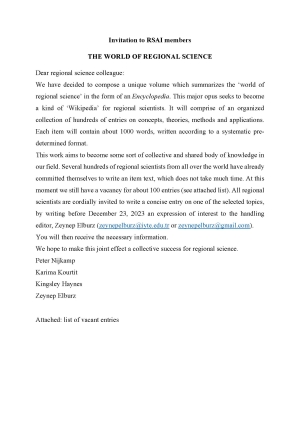

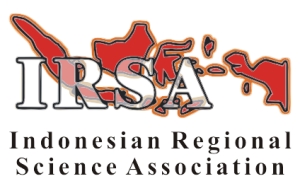
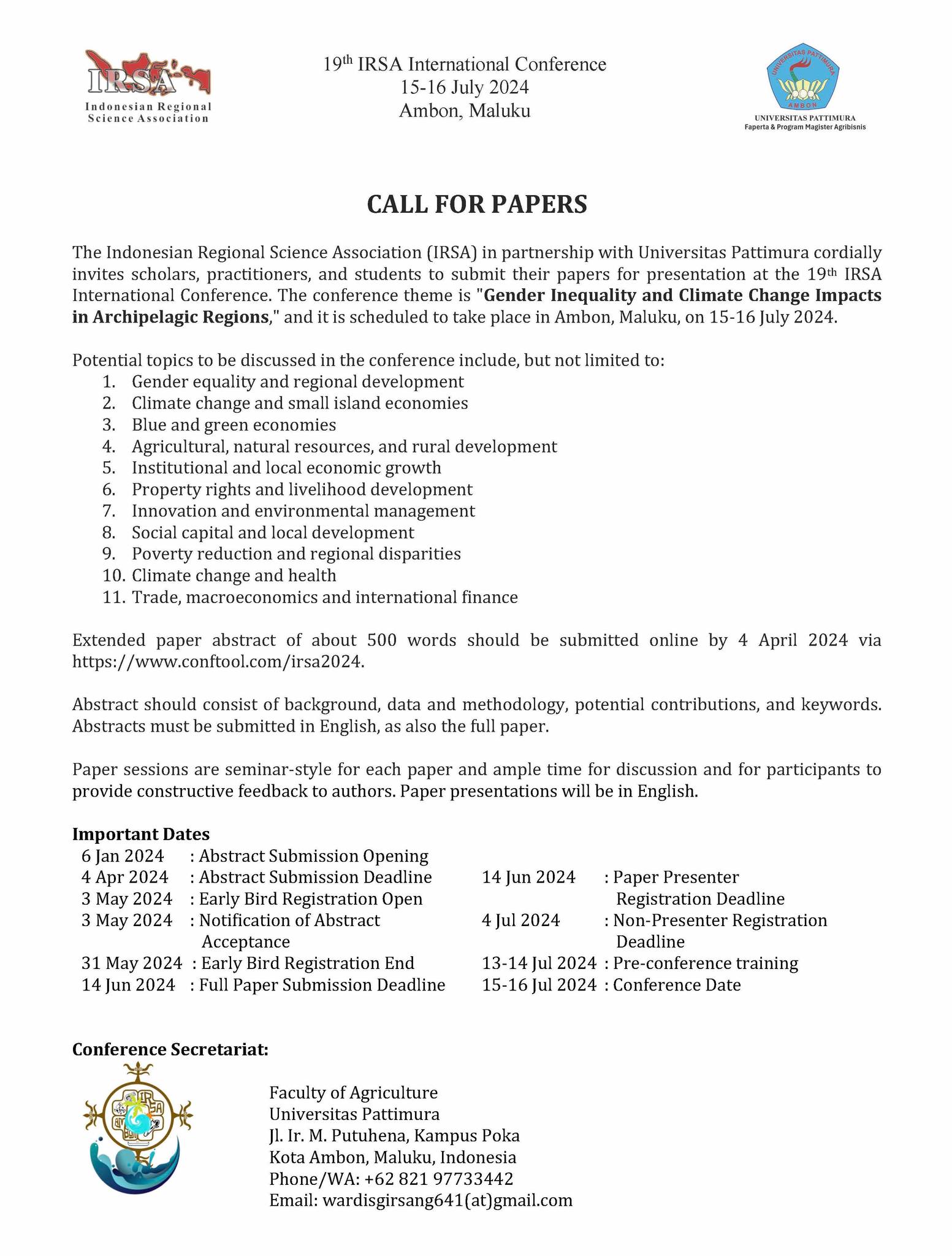
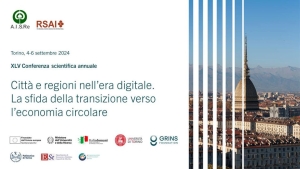
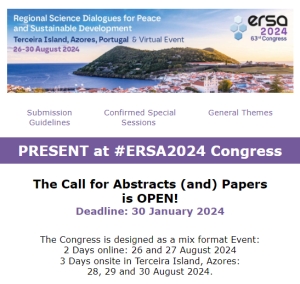





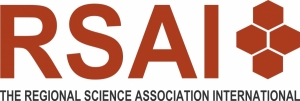
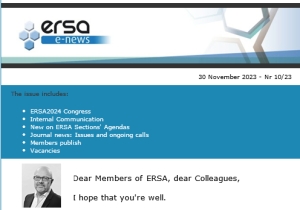

 Dear Members of ERSA, dear Colleagues,
Dear Members of ERSA, dear Colleagues,
















